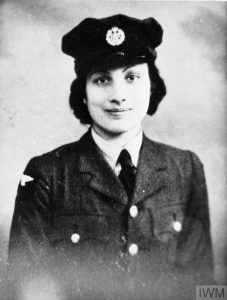Noor Inayat Khan GC (1914-1944)

Noor Inayat Khan was an agent of the British Secret Operations Executive (SOE) during the Second World War, working as a radio operator in occupied France. She demonstrated exceptional courage in this perilous role, saving many lives before she was betrayed and captured by the Gestapo in Paris. She refused to tell them anything and tried several times to escape. Transferred to Dachau concentration camp, she was brutally abused before being executed. I’ve always been very moved by her story and what is reported to have been the last word on her lips. As Tom Bromley writes in his chapter on her in a new book, On Courage: Stories of Victoria Cross and George Cross Holders:
‘As the pistol was raised to kill her, she uttered a single word: ‘Liberté’.’
Noor’s story is one of 28 tales of heroic men and women who won either the Victoria Cross or the George Cross for their bravery in time of war. All proceeds will go to charity, divided between Combat Stress and the Victoria Cross and George Cross Association.
Noor’s story in On Courage is told by author, editor and tutor Tom Bromley. I put a few questions to him.
Q: When did you first become aware of Noor’s story and the heroic role she played as a radio operator in German-occupied France during the Second World War, saving many lives?
A: I can’t remember where I first heard about Noor’s story: it is one I’ve been aware of for a long time, but only by working on this book did I really get to know about her life in detail.
Q: She was descended from an Indian Sultan and had a cosmopolitan upbringing, born in Moscow in 1914 and growing up in Paris and London. As you tell us in On Courage, her family was a loving one, whose members set great store on always telling the truth. Was it the combination of all of this that gave her the courage and determination to volunteer for SOE, the Special Operations Executive, during the Second World War? Or can you pinpoint individual character traits and influences leading her to follow this path?
A: I’m not sure how useful Noor’s desire to tell the truth was in her role – her SOE instructors were critical of it during her training. It’s guesswork from this distance, but I wouldn’t discount the influence of her father: he was a dynamic, driven individual which I’m sure rubbed off on his daughter. He died when Noor was thirteen, and her early stepping up in terms of taking responsibility, probably played a part too. Finally, I’d also mention the family’s escape from Paris in 1940, eventually boarding a boat to England at Bordeaux: the Germans bombed the convoy of cars leaving the French capital, which must have left its mark on Noor.
Q: I found it fascinating to read of her achievements and ambitions in writing stories for children. Are any of these available to read today?
A: You may have to search for them, but both Twenty Jataka Tales (Inner Traditions, 1991) and King Akbar’s Daughter (Suluk Press, 2013) are currently available.
Q: Why was it that the average life expectancy for an SOE radio operator in occupied France was only six weeks?
A: Because the work was so dangerous. Every time a radio operator broadcast, it gave away their location to Germans. Not only were continually moving around as a result, with the ever-increasing risk of getting caught, but they were doing so with the tell-tale sign of carrying their heavy kit around with them.
Q: When she was betrayed and captured by the Gestapo she seems at first to have been treated with something approaching courtesy, even being allowed to take a bath. What was it that changed this treatment to the brutality and torture which culminated in her death in Dachau?
A: When Noor was captured by the Gestapo, it was Officer Ernest Vogt who was tasked with trying to get her to talk. He later said that he admired her bravery and courage and that may have played a part in how she was treated while interrogated in Paris. But probably that attitude was also tactical: Vogt could sense he wouldn’t break Noor through harsh treatment, so used other, more psychological methods to try and get her to talk. But by the time she was transferred, her frequent attempts to escape had left her classed as ‘highly dangerous’ and was treated in Dachau as such.
Q: What lessons can we learn her from today?
A: What stood out for me when writing about Noor was her courage, determination and spirit. That never wavered in even the most difficult of circumstances, and she remained true to herself throughout – something we can all try to aspire to.
Buying Links:
Waterstones
Amazon



